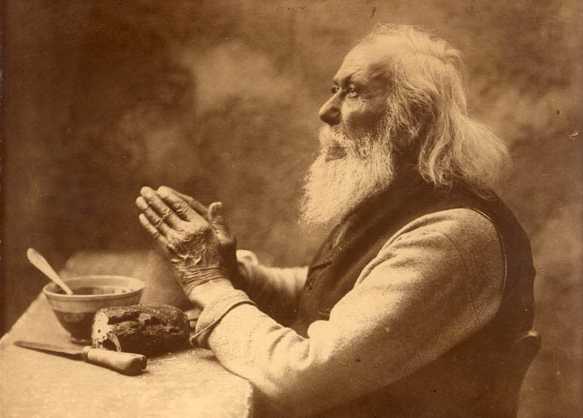 Passage from Dr. John R. Rice's excellent
book, The Charismatic Movement, on pages 136-139: Passage from Dr. John R. Rice's excellent
book, The Charismatic Movement, on pages 136-139:Some Christians talk in tongues. So do some Mormons, some devil-possessed spiritists, heathen witch doctors in Africa and Asia. Ages ago many heathen religions talked in tongues. It is not of itself necessarily of God. In his book, New Testament Teaching on Tongues, Dr. Merrill Unger calls attention to this fact, on pages 163-165: That tongues can be and are counterfeited by demon spirits is evidenced by the fact that spiritistic mediums. Muslim dervishes, and Indian fakirs speak in tongues. It must be remembered by those who try to make tongues a badge of spirituality or a status symbol of saints who have attained the height of spiritual experience, that speaking in tongues and their interpretation are not peculiar to the Christian church but are common in ancient pagan religions and in spiritism both ancient and modern. The very phrase "to speak with tongues" (Greek glosais lalein, Acts 2:4; 10:46; 19-6; 1st Cor. 12-14; cf. Mark 16:17) was not invented by New Testament writers, but borrowed from the ordinary speech of pagans. Plato's attitude toward the enthusiastic ecstasies of the ancient soothsayer (mantis, diviner,) recalls the Apostle Paul's attitude toward Glossolalia among the Corinthian believers. Virgil graphically describes the ancient pagan prophetess "speaking with tongues." He depicts her disheveled hair, her panting breast, her change of color, and her apparent increase in stature at the god (demon) came upon her and filled her with this supernatural afflatus. Then her voice loses its mortal ring as the god (demon) speaks through her, as in ancient and modern necromancy (spiritism). Phenomena of this type are common among savages and pagan peoples of lower culture. Ecstatic utterances interpreted by a person in a sane state of mind have been verified, In the Sandwich Islands, for example, the god Oro gave his oracles through a priest who "ceased to act or speak as a voluntary agent, but with his limbs convulsed, his features distorted and terrific, his eyes wild and strained, would roll on the ground foaming at the moth, and reveal the will of the god in shrill cries and sounds violent and indistinct, which the attending priests duly interpreted to the people." So, intelligent and concerned people will want to find out what is of
God and what is of evil spirits. IN NON-CHRISTIAN RELIGIONS.--Tongues occupied a significant place in ancient Greek religion. The seeress at Delphi, not far from Corinth, spoke in tongues. According to Plutarch (A.D. 44-117), interpreters were kept in attendance to explain her incoherent utterances. Many scholars have stated that tongues were experienced in the mystery religions (Osirius, Mithra, Eleusinian, Dionsyian, and Orphic cults). Some have concluded that the unintelligible lists of "words" in the "magical papyri" and in certain Gnostic "prayers" are records of ecstatic utterances. About A.D. 180 Celsus reported ecstatic utterances among the Gnostics. Lucian of Samosata (A.D. 120-198) described tongues speaking as it was practiced by the devotees of the Syrian goddess, Juno. Today shamans (witch doctors, priests, or medicine men) in Haiti, Greenland, Micronesia, and countries of Africa, Australia, Asia, and North and South America speak in tongues. Several groups use drugs to aid in inducing the ecstatic state and utterances. Voodoo practitioners speak in tongues. Buddhist and Shinto priest have been heard speaking in tongues. Moslems have spoken in tongues, and an ancient tradition even reports that Mohammed himself spoke in tongues. According to his own account, after his ecstatic experiences he found it difficult to return to "logical and intelligible speech" (Kelsey, p. 143). IN MENTAL ILLNESS.--The fact hat nonreligious tongues speaking often occurs in association with certain mental illnesses is well documented. Psychiatrists have reported it in association with schizophrenia, neurosis, and psychosis. Probably all psychiatrists and psychologists are aware of the possibility of psychic damage resulting from tongues speaking (Kelsey, p.227). It was reported that following the extended tongues meeting held by Aimee Semple McPherson, founder of the Church of the Foursquare Gospel, mental institutions in the area of her meeting were overburdened. The Episcopalian church financed a study commission which concluded that tongues are "not per se a religious phenomenon" and may appear among those "who are suffering from mental disorders as schizophrenia and hysteria" (Jennings, p.11) IN SPIRITISM.--Tongues speaking occurs among anti-Christian spiritistic mediums. Contrary to popular belief among tongues speakers, a few years ago the European Pentecostal Conference admitted that "tongues might occur apart from the Spirit's action" (Brown, p.151) IN THE DEMON POSSESSED.--Even Pentecostal authors grant that there are cases where demonic influence is apparently responsible for tongues utterances. Some feel that this is why "the gift of discernment of spirits" is necessary. Again on page 38 Dr. Smith says: In extra biblical literature this word was used to describe the "inspired" utterances of diviners. Moulton and Milligan cite three occurrences of the word in Vettius Valens where it designates irrational or unintelligible speech. It is stated that the speakers' minds had "fallen away," they were overcome with "madness," and they spoke in "ecstasy" (p. 72). Apoptheggomai was almost a technical term for describing the speech of the oracle-givers, diviners, prophets, exorcists, ecstatics, and other "inspired" persons (Kittel, I, 447; Arndt and Gingrich, p. 101). The basic idea is "an unusual utterance by virtue of inspiration." Though the word obviously cannot be limited to unintelligible speech, it is certainly appropriate for such. Its usage in Greek literature, in fact, definitely suggests a connection with ecstatic, often unintelligible, utterances. If a Mormon talks in tongues with his false religion, is that speaking with tongues the Bible gift of tongues? I think not. If an unconverted Catholic who prays to Mary, confesses to a priest, hopes to get out of purgatory if enough people pay for masses and if he hasn't sinned badly, talks in tongues, is that the Bible gift of tongues? I think not. Evidently Satan can have people talk in tongues also, and we need to carefully consider that when we talk about the gift of tongues. End
|
